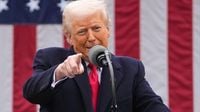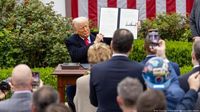On Wednesday, April 3, 2025, U.S. President Donald Trump announced a series of "comprehensive reciprocal tariffs" aimed at U.S. trading partners worldwide, marking what he described as the "beginning of a golden age" for American manufacturing. Trump's intention is to encourage international companies to invest and produce in the United States, thereby creating new jobs. However, this bold move has significant implications for global trade and economic globalization, with several countries already announcing countermeasures.
The Asian export nations, including China, Japan, South Korea, and Vietnam, were hit hardest by the new tariffs. For China, the tariff rate will see a dramatic increase from 20% to 54% when the new measures come into effect on April 9, 2025. This escalation has drawn sharp criticism from Beijing, which has vowed to retaliate, although specific countermeasures were not detailed immediately. Fang Dongkui, Secretary-General of the Chinese Chamber of Commerce in the EU, stated, "Tariffs lead to protectionism that severely impacts the global economy," urging the U.S. to engage in negotiations rather than imposing tariffs. He emphasized the need for China and the EU to collaborate closely to defend the multilateral trading system, as both are export-oriented economies.
Japan, a strategic ally of the U.S. in Asia and currently the fourth-largest economy behind Germany, faces tariffs of 24%. Notably, Trump's punitive tariff on Japan's rice market is set at an astonishing 700%. Japanese Agriculture Minister Taku Eto criticized the measures as "illogical," while Prime Minister Shigeru Ishiba expressed extreme disappointment over the U.S. announcement, pledging support to the domestic industry to mitigate potential fallout. The 25% tariffs on all auto imports, including those from Japan, took effect on the same day, raising concerns within Japan's automobile sector, which is crucial to its economy.
Meanwhile, Indian Prime Minister Narendra Modi, described by Trump as a "great friend," will see tariffs imposed on goods exported to the U.S. ranging from 26% to 27% starting April 9. The U.S. is India's largest trading partner, with bilateral trade reaching $129.2 billion in 2024. Despite previous attempts to negotiate a bilateral trade agreement, India has not yet succeeded. In response to the tariffs, Indian officials have been cautious, stating they are assessing the impact on exports while still aiming to finalize a trade agreement within the year. Lekha Chakraborty, a professor at the National Institute of Public Finance and Policy in New Delhi, noted that while short-term fluctuations are expected, ongoing negotiations could mitigate long-term damage.
Southeast Asian nations are also feeling the brunt of Trump's tariff policy. Six economies in the region will face tariffs ranging from 32% to 49%. Vietnam, which has emerged as a significant exporter to the U.S. in recent years, faces a punitive tariff of 46%. The country exported goods worth $142 billion to the U.S. last year, accounting for about 30% of its GDP. Khac Giang Nguyen, a researcher at the ISEAS Yusof Ishak Institute, commented, "Trump's tariffs have little to do with how bilateral trade actually functions; they may be intended as a negotiation tactic, but they are far from effective." In response to the tariffs, the Vietnamese government has formed a "rapid response task force" to address the implications of the U.S. tariff announcements.
Indonesia, another Southeast Asian economy, will face a 32% tariff starting next week, which Bhima Yudhistira, Executive Director of the Center of Economic and Law Studies, warns could trigger an economic recession. He expressed concern about a potential increase in the "beggar-thy-neighbor" practice, where countries affected by higher tariffs may see reduced orders from Western buyers. The Thai government is also bracing for impact, with Prime Minister Paetongtarn Shinawatra advocating for negotiations rather than retaliatory measures.
The fallout from Trump's tariffs has not been limited to Asian nations. In Europe, the response has been swift. The Dax, Germany's leading stock index, plummeted by up to 5.2% following China's announcement of retaliatory measures, reflecting growing fears of a full-blown trade war. The Stoxx 600 index, which encompasses the 600 largest companies in Europe, has seen losses exceeding 7.6% for the week, marking the worst performance since March 2020.
European politicians are calling for a unified response to Trump's tariffs. SPD politician Katarina Barley emphasized the need for a clear and effective reaction, including possible counter-tariffs and taxation of digital services. "It is unacceptable for our industries to be targeted while large U.S. corporations profit here and pay minimal taxes," she stated, asserting that Europe will not be coerced and is prepared to act decisively.
In Canada, Prime Minister Mark Carney announced retaliatory tariffs on vehicle imports, specifically targeting cars not produced under the USMCA trade pact, with a 25% import fee set to take effect. Carney noted that the objective is to inflict maximum damage on the U.S. economy while minimizing harm to Canada’s own economy.
Despite the aggressive tariff strategy, Trump has also hinted at potential negotiations, offering China a tariff discount in exchange for approval of the sale of the short video service TikTok. This move reflects a complex interplay of economic and political interests as Trump's administration navigates the escalating tensions between the two largest economies in the world.
As the global community watches closely, the ramifications of Trump's tariffs are likely to unfold in the coming weeks, with significant implications for international trade relations, economic stability, and the future of globalization itself. The situation remains fluid, and the potential for a trade war looms large, prompting urgent calls for dialogue and cooperation among affected nations.






